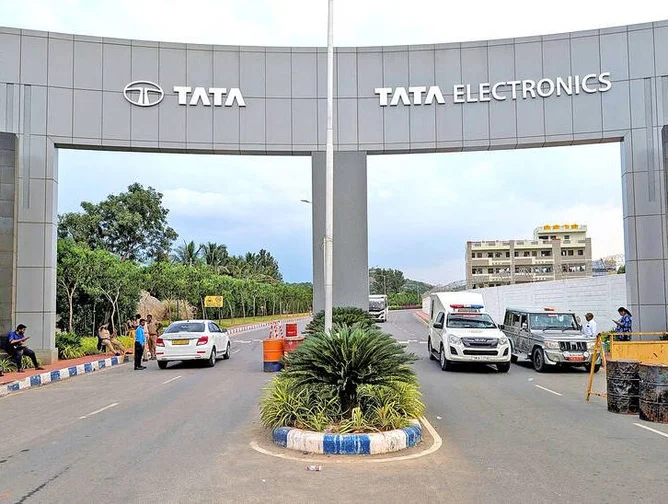With Tata’s new 60% stake in Pegatron’s iPhone manufacturing plant in Tamil Nadu, we highlight the reasons why Apple is growing its operations in India.
In November 2024, there was a great deal of buzz surrounding a deal between Tata Electronics and Pegatron.
This deal centers on Pegatron’s iPhone manufacturing plant in Tamil Nadu, India.
According to reports, Tata Electronics will acquire a 60% stake in the plant, with Pegatron retaining a 40% share and providing vital technical support.
Why has this deal generated so much interest? Because its a impactful strategic move for both Tata and Apple.
The development will make India a key manufacturing hub for Apple, with the Tamil Nadu facility employing 10,000 workers and producing about 5 million iPhones annually.
This marks a shift in strategy for Apple, expanding its manufacturing presence in other nations as opposed to China.
It’s also a strategic move for Tata Electronics, consolidating its foothold in the iPhone market to rival Foxconn, India’s other major iPhone manufacturer.
The Tamil Nadu facility will be Tata’s third iPhone manufacturing unit in India, after it previously acquired Wistron’s iPhone assembly plant in Karnataka and pursues plans to develop a new facility in Hosur.
All the companies involved are yet to issue official statements.
But when they do, this deal will contribute to further manufacturing growth in India and the popularisation of the ‘Make it in India’ initiative.
Apple has chosen this path due to a combination of strategic factors, ranging from its supply chain to India’s manufacturing potential.
1. Supply chain diversification
One of the biggest reasons Apple is expanding in India is to reduce its manufacturing and supply chain resilience on China.
Driving this move is growing geopolitical tensions between China and the US.
Donald Trump, set to be sworn in as US president on January 20th this year, has made clear his intention to implement strong tariffs on Chinese goods.
This comes after his first term as President, with his infamous 2018 ‘tariff spree’. On June 15th of that year, Trump released a list of US$34bn of Chinese goods to be hit with a 25% tariff.
Then another list with US$16bn worth of Chinese goods was released.
Now in 2024, Trump has expressed these tariffs could be as high as 40%, prompting Chinese and US manufacturers alike to take action.
This development adds to the lessons learned from the COVID-19 pandemic. Many manufacturers, hit hard by closed ports and paused production, had to reckon with how dependent they were on a small amount of suppliers.
To navigate geopolitical tensions and trade restrictions, supply chain diversification is vital.
Apple is pursuing exactly that, recognising India’s growing manufacturing ecosystem and potential to provide a stable environment for large-scale production.
2. Government incentives
More manufacturers than ever are making their goods in India – a reality that the Indian government has helped to create.
Through policies such as the Production Linked Incentive (PLI) scheme and the ‘Make it in India’ initiative, has encouraged domestic and foreign companies to invest in manufacturing.
Apple’s contract manufacturers, including Foxconn, Pegatron and Wistron, have benefited significantly from these incentives, boosting their expansion in India.
Subsidies and tax benefits further make India an attractive option for manufacturers seeking to scale operations.
3. A growing Indian consumer base
India has a population of over 1.4 billion, representing one of the world’s largest consumer bases.
Its rapidly growing middle class, increasing disposable incomes and a rising demand for premium smartphones has inspired apple to expand local production to better meet domestic needs.
Manufacturing locally also allows Apple to avoid hefty import duties, making its products more competitive in price.
4. A skilled workforce
India offers a vast pool of skilled labour particularly in the technology and electronics manufacturing sectors.
With a focus on workforce development, companies like Apple can access to trained workers capable of meeting stringent quality standards.
The lower labor costs in India compared to other major manufacturing hubs make it a highly cost-effective option for the company as well.
5. The development of its strategic partnerships
Apple is also seeking to expand in India to expand its partnerships with local suppliers and contract manufacturers.
These include Foxconn and Tata Electronics, now part of Apple’s robust industrial ecosystem.
By leveraging existing infrastructure and expertise, Apple has been able to accelerate its manufacturing activities in India.
Additionally, Indian suppliers are increasingly adopting global standards, ensuring Apple’s requirements are met efficiently.
With its favourable policy environment and cost-effective resources, India continues to attract a multitude of manufacturers.
Like Apple many seek to diversify their supply chains and appeal to the domestic consumer market, recognising the nation’s potential as a key manufacturing hub.



